Sudański minister inwestycji, Mubarak Al-Fadil Al-Mahdi, powiedział, że kraje arabskie “kupczą sprawą palestyńską ad nauseam” i że normalizacja stosunków z Izraelem powinna być zdecydowana na podstawie interesów Sudanu. „Nie sądzę, że to taki wielki problem – powiedział – Sami Palestyńczycy znormalizowali stosunki z Izraelem”. Występując w Sudania 24 TV 21 sierpnia Al-Mahdi chwalił demokratyczny i przejrzysty reżim Izraela oraz wprowadzenie do Egiptu izraelskich upraw cytrusowych i nawadniania kropelkowego. Zapytany, czy planuje sprowadzenie do Sudanu firm izraelskich, odpowiedział: „Technologia nie ma narodowości”.
Mówiąc w podobnym duchu, duchowny sudański, Jousuf Al-Kodan, na konferencji w Chartumie zatytułowanej “O przebudzeniu [religijnym] i dialogu” wezwał 6 lutego 2017 r. do rozejmu między Sudanem i Izraelem oraz o ustanowienie stosunków dyplomatycznych między tymi dwoma krajami, mówiąc, że byłoby to dozwolone według szariatu.
Poniżej jest klip MEMRI TV wraz z tekstem wypowiedzi ministra Al-Mahdiego oraz raport MEMRI z wypowiedzi Al-Kodan.
Minister sudański Mubarak Al-Mahdi: Normalizacja stosunków z Izraelem nie jest wielkim problemem; Arabowie kupczą sprawą palestyńską ad nauseam
Żeby zobaczyć ten klip z Mubarakiem Al-Fadilem Al-Mahdim w MEMRI TV, kliknij tutaj lub poniżej.
Mubarak Al-Fadil Al-Mahdi: Czy ludzie z Darfuru nie uciekali do Izraela przed ciężkim losem w Sudanie? Czy nie odkryli, że nie ma nic złego z Izraelem, jeśli o nich chodzi? To jest cała inna debata filozoficzna. Mam własne zdanie o sprawie palestyńskiej, Izraelu i tym wszystkim. Myślę, że ludzie są w to bardziej zaangażowani emocjonalnie, niż uzasadnia to rzeczywistość.
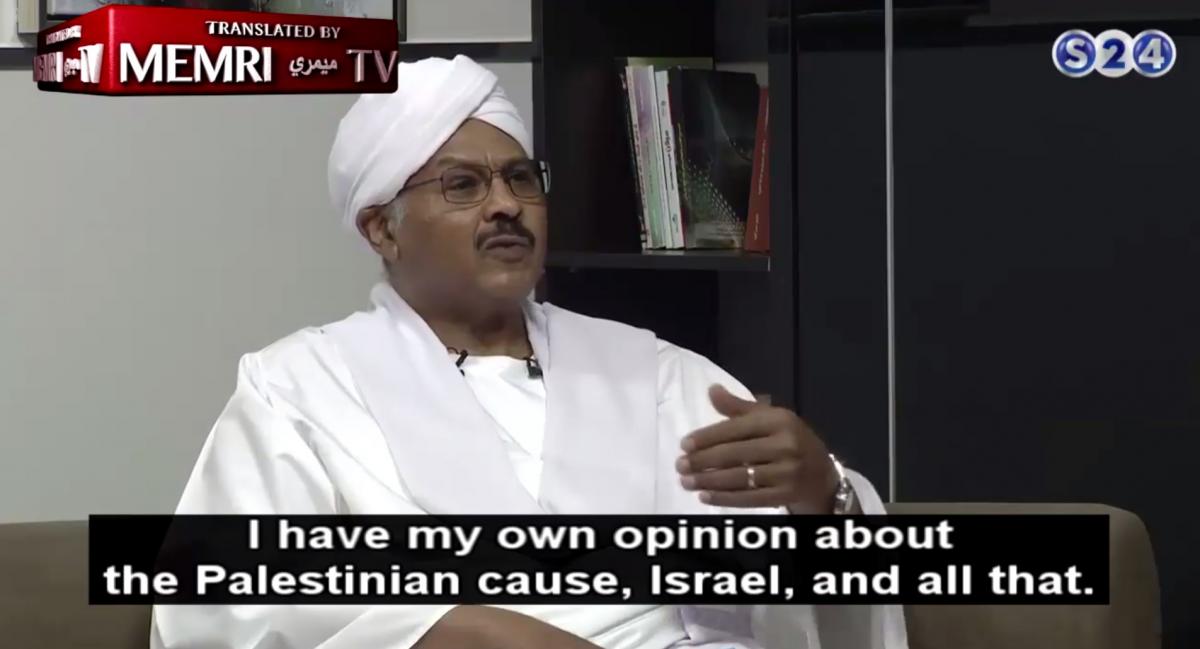

Prowadzący wywiad: Jak właściwie?
Mubarak Al-Fadil Al-Mahdi: Taka jest moja opinia. Uważam, że Palestyńczycy ponoszą dużą część odpowiedzialności za to, co się im przydarzyło. Sprzedali swoje ziemie i spowodowali wiele problemów. Arabowie popełnili poważne błędy przez odrzucenie planu podziału i innych rezolucji. Kraje arabskie kupczyły sprawą palestyńską. Gdy tylko ktoś dokonuje zamachu stanu, mówi, że to dla wyzwolenia Palestyny… Kupczą sprawą palestyńską ad nauseam. Stała się towarem politycznym w świecie arabskim.
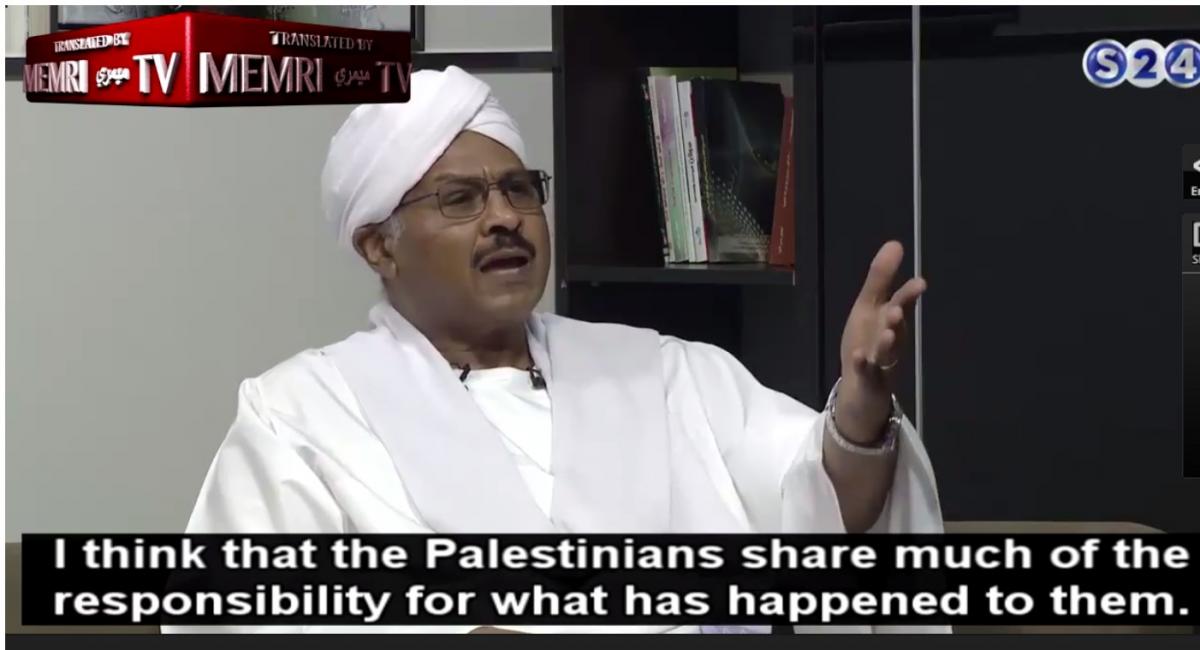

Prowadzący wywiad: Gdybyśmy oferowali normalizację naszych stosunków z Izraelem… Jako polityk, popierałby pan to, czy sprzeciwiał się?
Mubarak Al-Fadil Al-Mahdi: Uważałbym to za zgodne z interesami Sudanu. Teraz, dzisiaj…
Prowadzący wywiad: Decydowałbym zgodnie z interesami Sudanu… Czy normalizacja stosunków z Izraelem leży w najlepszym interesie Sudanu, czy nie?
Mubarak Al-Fadil Al-Mahdi: Nie opieram tego na emocjach, ale na interesach Sudanu. Wszystkie kraje znormalizowały swoje stosunki z Izraelem.
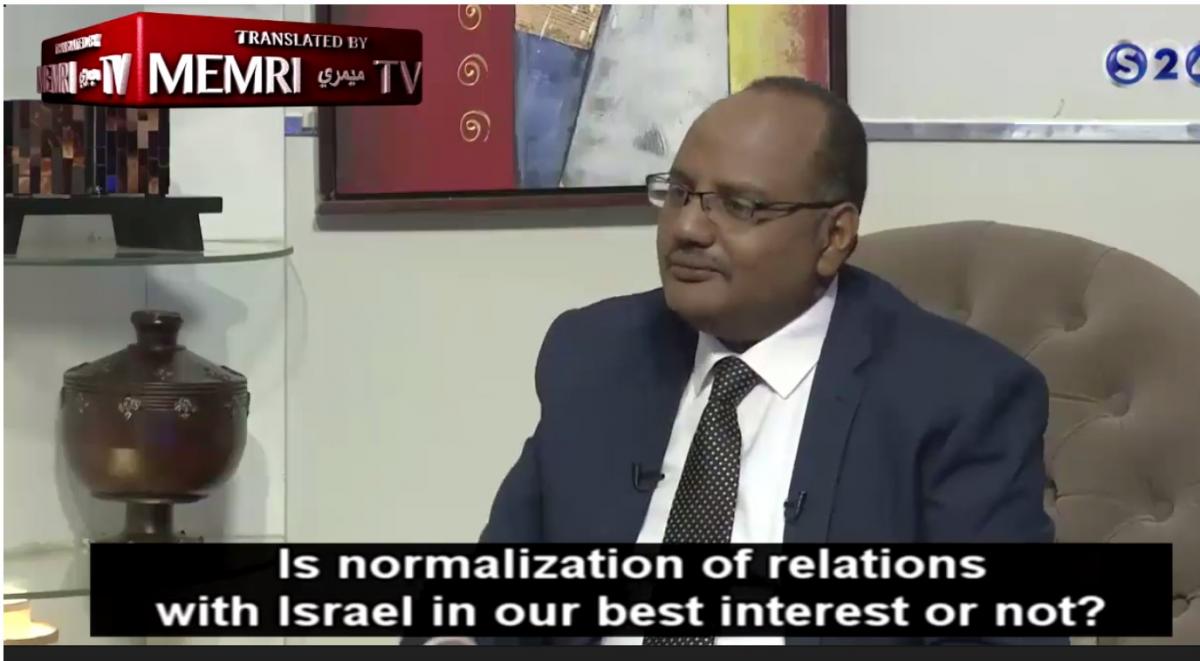
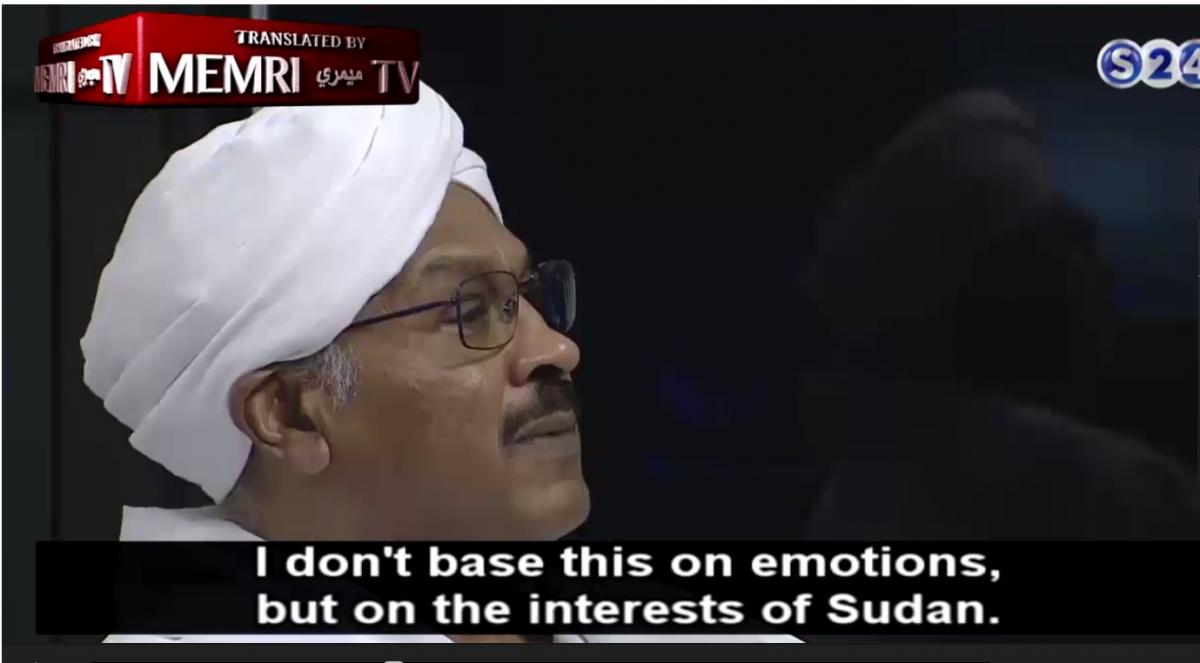
Prowadzący wywiad: Nie ma pan więc zastrzeżeń do takiej normalizacji?
Mubarak Al-Fadil Al-Mahdi: Nie uważam, że to taki wielki problem. Sami Palestyńczycy znormalizowali stosunki z Izraelem.
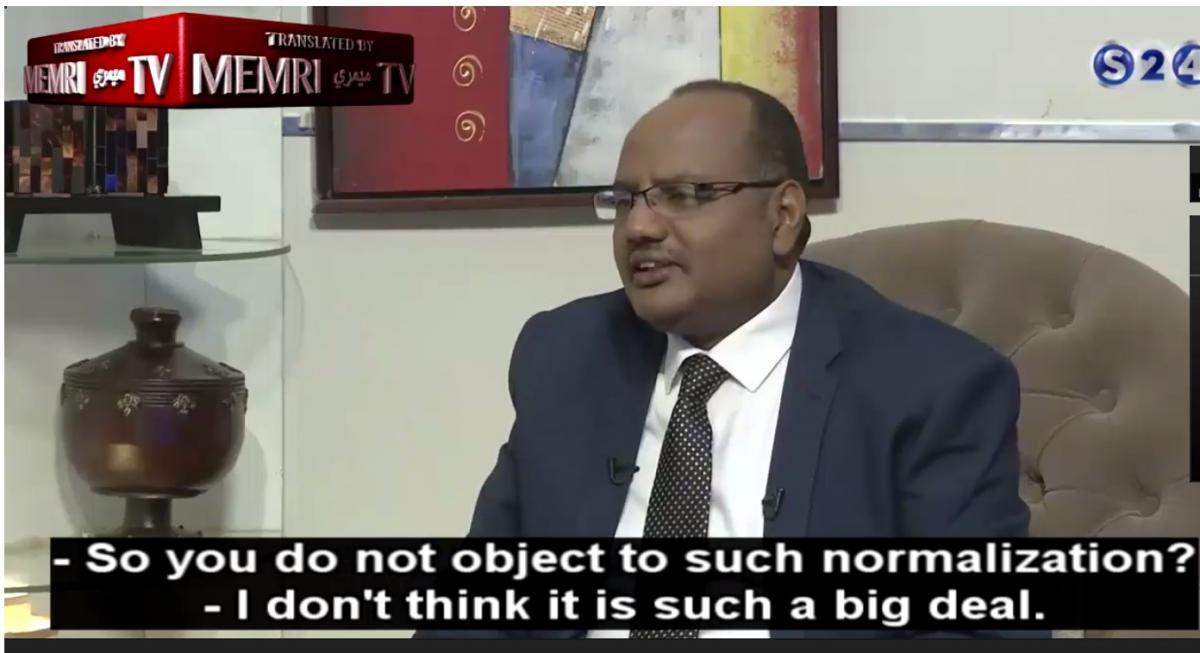
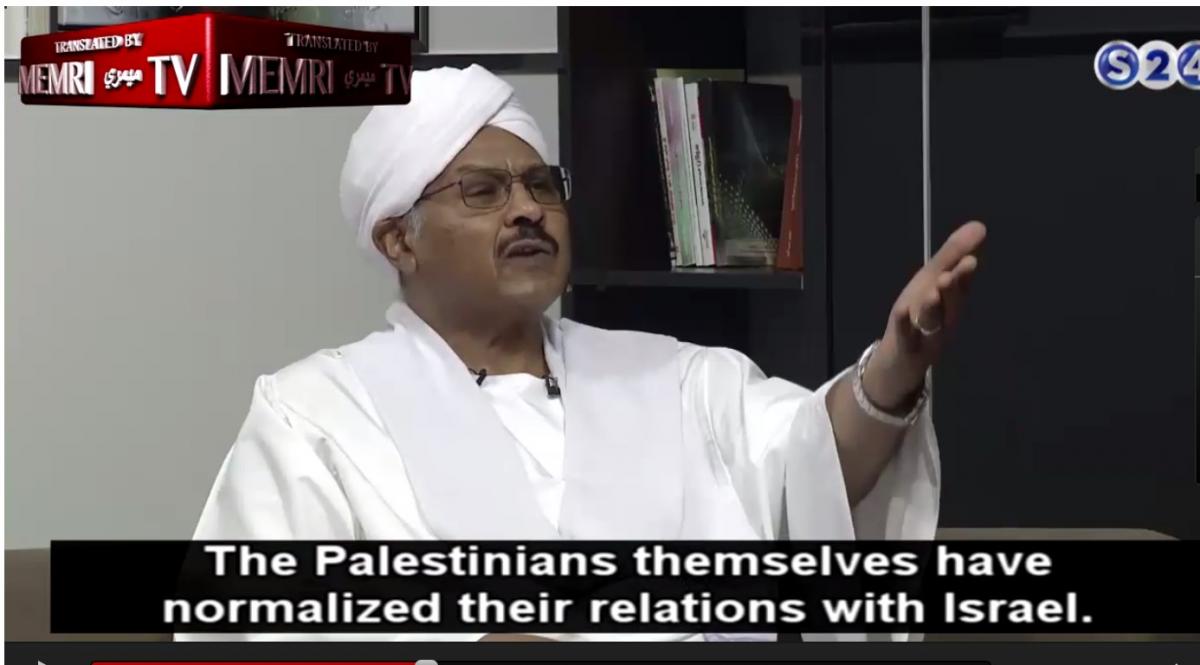
[…]
Cała sprawa jest bardzo złożona. Nie jest czarnobiała. Sami Palestyńczycy spotykają się z Izraelczykami. Współistnieją z Izraelczykami, zarabiają tam na życie i dostają od nich elektryczność. Te narody żyją razem.
[…]
Uważam, że sprawa palestyńska opóźniła postęp świata arabskiego i była wykorzystywana przez reżimy arabskie do uciskania własnej ludności pod pozorem walki na rzecz Palestyny. Uważam, że Palestyńczycy sami zajmują się swoją sprawą. Spotykają się z Izraelczykami. Nawet Hamas. Niezgoda lub nie, spotykają się z nimi. Mają Porozumienie z Oslo i inne porozumienia. Kraje arabskie myślą o własnych interesach. W Egipcie Israelczycy rozwinęli uprawy cytrusów. Wprowadzili nawadnianie kropelkowe. Jousef Wali zrobił z nimi wspaniałe rzeczy.
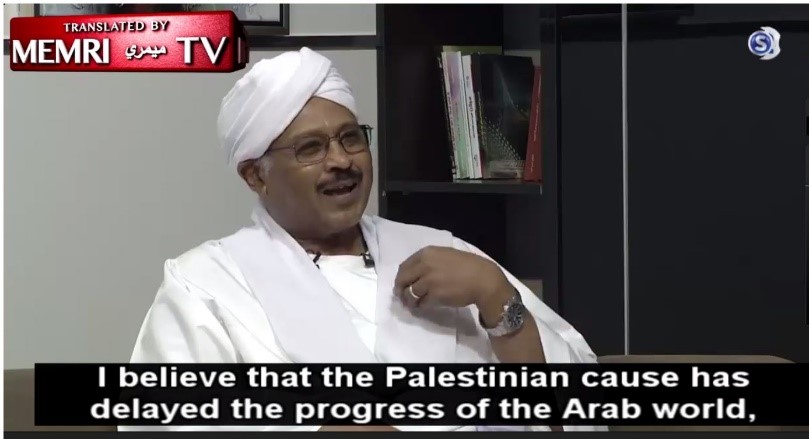
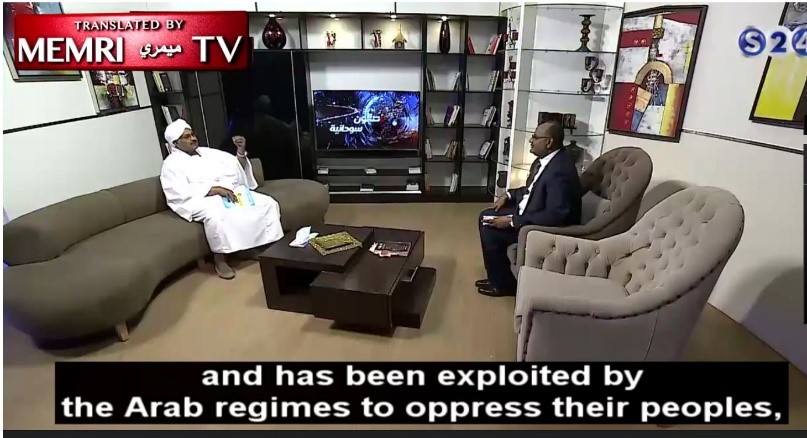
Prowadzący wywiad: Nie planuje pan, jako minister inwestycji, sprowadzenia Izraelczyków tutaj, prawda?
Mubarak Al-Fadil Al-Mahdi: Nie jestem fanatykiem. Nie wierzę, że teraz, w tym momencie historii… Myślę, że porwały nas emocje i nie zdawaliśmy sobie z tego sprawy. Ci Palestyńczycy, wszędzie, zrobią wszystko, co w ich mocy, by cię wyrzucić. Proszę spytać jakiegokolwiek Sudańczyka, który pracuje w Zatoce lub gdzie indziej, a powie, że kiedy spotyka Palestyńczyka, ten Palestyńczyk nic do niego nie czuje. Natychmiast spiskuje, jak doprowadzić do wyrzucenia go z firmy. Nie są wdzięczni za empatię, jaką otrzymują od świata arabskiego.
Prowadzący wywiad: A co z Izraelczykami?
Mubarak Al-Fadil Al-Mahdi: Nie mieliśmy do czynienia z Izraelczykami. Izraelczycy są ludźmi Zachodu. Są “importowani” z Ameryki, Rosji, Europy i tak dalej. Mają wartości moralne Zachodu. Działają naukowo. Mają demokratyczny reżim, ich prezydenci mają procesy sądowe i idą do więzienia… Mają przejrzystą władzę, czy zgadzasz się z nimi, czy nie.




Prowadzący wywiad: Nie planuje pan ściągnięcia tutaj jakichś firm izraelskich, żeby założyli nam rośliny cytrusowe, prawda?
Mubarak Al-Fadil Al-Mahdi: No cóż, uważam, że technologia nie ma narodowości. Nie powinno pana obchodzić, skąd bierze pan technologię.
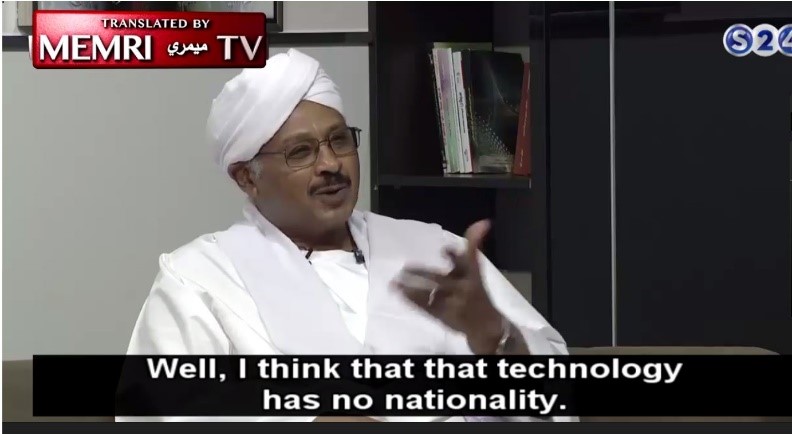
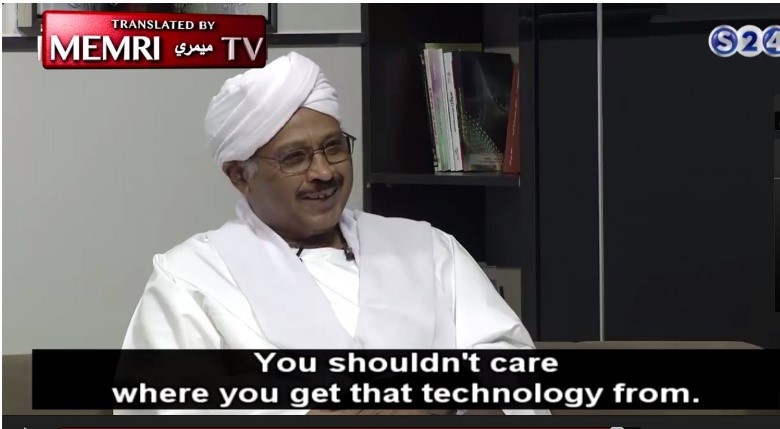
Duchowny sudański: islamski szariat pozwala na normalizację stosunków z Izraelem
Na konferencji zatytułowanej “O przebudzeniu [religijnym] i dialogu” która odbyła się w stolicy Sudanu, Chartumie, 6 lutego 2017 r. sudański opozycjonista i duchowny, Jousuf Al-Koda, były członek Sudańskiej Organizacji Uczonych, a obecnie przewodniczący partii islamskiej Wasat, wygłosił wykład pod tytułem „Stosunki z Izraelem – aspekty religijne”. W wykładzie wezwał Sudan do ogłoszenia rozejmu z Izraelem i ustanowienia z nim stosunków dyplomatycznych, mówiąc, że nie ma zakazu religijnego, który by temu przeszkadzał. Jako dowód wspomniał porozumienie Hudaibija, które prorok Mahomet podpisał ze swoimi niewiernymi rywalami.
Al-Koda powiedział, że bojkotowanie Izraela nie szkodzi Izraelowi, ale Sudanowi, i że inne kraje w regionie mają kontakty z Izraelem. Powiedział następnie, że Sudan ma stosunki nawet z pewnymi krajami, które okupują ziemię sudańską, ale nie wymienił tych krajów.
Poniżej podajemy fragmenty doniesień medialnych o wypowiedziach Al-Kody podczas konferencji. [Fragmenty te nie są spolszczone]
According to a report on the news website Sudanese Online, „Al-Koda said that, regardless of his opposition to any occupation of land, the occupation of the Al-Aqsa Mosque does not prevent establishing relations with Israel. As evidence he presented the Hudaibiya agreement[1] that the Prophet Muhammad signed with the infidels even though the infidels had taken over the Kaaba and even though most of the [agreements’] clauses were detrimental to the Prophet’s companions. As further [evidence] he mentioned that the Palestinian Authority itself maintains ties and [security] coordination with Israel. [He added that] neighboring sister states are occupying land in northern and eastern Sudan, but this has not prevented [the Sudanese government] from maintaining close relations with them, and that some Arab and Muslim countries have relations with Israel.”[2]
The website quoted Al-Koda as saying: „The fact that Jerusalem is in the hands of the Jews should not prevent us from maintaining ties with them, if the people want this. I am not saying we are obligated to maintain ties with them. My statements are not meant to [urge people] to go and establish ties [with Israel]. I merely want to clarify that this is perfectly permissible according to the Muslim shari’a and that there is nothing wrong with it.”
He was also quoted as saying: „The boycott has not harmed Israel but rather Sudan, and despite all the time that has passed [since its imposition] there has been no discussion of the boycott, as though it is an end in itself or a religious duty.” He wondered: „Why shouldn’t we propose reassessing this position and adopting a different one in its place?”
According to the report, Al-Koda said that „as an observer, he had noticed that Israel was now ready to hold ties with Sudan and with other countries and that he did not think this was a problem. He clarified that relations with Israel did not mean avoiding talking about the settlements or about Israeli violations.”
Al-Koda delivering his address at the conference (Al-Jamahir, Sudan, February 6, 2017).
Al-Koda added: „The Prophet’s biography tells not only of fighting but of warding off danger and of reconciliations, truces and alliances… Why then do we know only about the fighting and the jihad, as though they are the only option and there is no other option, in any form and under any circumstances?”[3]
According to a report in the newspaper Al-Jamahir, Al-Koda said in this context: „Why do we not declare something other than jihad and fighting? I prefer [to declare] a truce [with Israel]. A truce does not mean making concessions. Very powerful countries that are not major parties [in the Israeli-Palestinian conflict], including Turkey, Qatar, Jordan and Egypt, have normalized [relations with Israel].”[4]
Speaking on Sudania 24 TV two days after the conference, on February 8, Al-Koda repeated his statements, saying the shari’a does not prohibit normalization of ties with Israel, and stressing that normalization with any country – not just Israel but also the U.S. and Russia – would promote stability and peace. In response to the interviewer’s comment that, even if Al-Koda advocates normalization of ties with Israel for the sake of promoting Sudan’s interests, he should not use religion to justify this, Al-Koda replied: „Do you really think that religion has nothing to do with interests? Religion is based entirely on interests.” For a MEMRI TV clip of his statements, click on the player below.
According to the Sudanese newspaper Al-Jarida, Al-Koda claimed that people had threatened to kill him if he delivered the talk and „opened the gates of evil,” but that he was willing to risk his life and even the lives of his children in order to express his opinion.[5] Another report in the same newspaper stated that Al-Koda’s remarks elicited a response from 'Abd Al-Rahman 'Abdallah, the representative of the Al-Tahrir party at the conference. The latter „condemned [Al-Koda] for presenting [the fact that] that some [Muslim] countries do not boycott Israel and that even Palestinian President Abu Mazen maintains ties with it as evidence for his position, saying that 'people’s behavior does not constitute evidence [that something is sanctioned by the Islamic shari’a].’ [’Abd Al-Rahman 'Abdallah] also criticized the Sudanese government for normalizing relations with the U.S., seeing this as [a step] towards normalizing relations with Israel and adding that this was 'a twofold [act of] treason’… Al-Koda responded that 'even the Hamas leadership is funded by Qatar, which maintains normal [relations] with Israel, and noted that Sudan was unable to confront Israel [militarily]. The Al-Tahrir party representative interrupted him, saying: 'The Muslims are capable of defeating Israel,’ to which Al-Koda replied: 'You cannot defeat Israel by sitting at home.'”
Al-Koda, said the report, „claimed that Sudan had lost a lot by declaring its hostility to Israel, and added: 'Sudan lost on the moral and material level when Israel breached its sovereignty by staging attacks on its soil, and [also] due to all the damage done to it by the U.S. because of its bad relations with Israel.’ He denied that the [Sudanese] government was behind his initiative, saying that he still opposes the government. He explained that his call to reassess the position on Israel stemmed from a wish to stimulate public debate on this issue.”[6]
[1] In the agreement, signed between the Prophet Muhammad and his Meccan rivals in 628 for a period of 10 years, the Prophet accepted the humiliating terms dictated by his rivals, recognizing his inferior strength. The agreement was violated two years later, with Muhammad’s conquest of Mecca.
[2] Al-Koda said he did not wish to name the countries occupying Sudanese land. See Al-Jamahir (Sudan), February 6, 2017.
[3] Sudaneseonline.com, February 6, 2017.
[4] Al-Jamahir (Sudan), February 6, 2017.
[5] Facebook.com/aljareeda.sudanese.newspaper, February 7, 2017.
[6] Facebook.com/aljareeda.sudanese.newspaper, February 7, 2017.
If you wish to reply, please send your email to memri@memrieurope.org.









